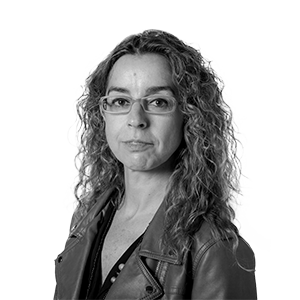"Wherever they take us, what I want is to find a job"
Javad, the translator from Herat, arrives safe and sound in Madrid with his family


BarcelonaAt four o'clock in the morning a Spanish soldier came to the area where dozens of Afghans were sleeping on the ground at the military airport in Kabul, and began to read out the names of some of them, explains Javad Hossaini, who was one of those trying to fall asleep without success. It was too cold, he says. Kabul is almost 1,800 metres above sea level and at this time of year temperatures already plummet at night. The soldier called out his name, his wife's name and that of his 5-year-old son. At last they could board a Spanish military flight to be evacuated from Afghanistan.
Javad has been a translator for several Spanish journalists for years. Moreover, both he and his family belong to the Hazara ethnic group, which the Taliban are so hostile to because they are Shiite Muslims. The Taliban are Sunni. Javad is convinced that if he had stayed in Afghanistan, his life would have been in danger. That's why he sighed with relief when he heard his name, his wife's name and his son's name.
When they boarded the plane, he explains, they did not take any PCR or lateral flow test, but the military did distribute masks and hydroalcoholic gel among all passengers. "There were about 200 of us", says Javad. Many flew sitting on the floor of the aircraft. They had to make the most of all the space to evacuate as many people as possible. The family were lucky: they were assigned two seats, although their son had to travel on the lap of one of them.
Before take-off, the military gave a clear instruction to the passengers: they advised them not to drink or eat because there was no toilet on the military plane, Javad says. In theory, the journey was short: only three hours to Dubai. But once they arrived in Dubai, he complains, they had to spend three more hours inside the aircraft, waiting. And then the problem was not only that there was no toilet, but also that it was stiflingly hot, he says.
They hardly set foot in Dubai. As soon as they disembarked, they were transferred by bus to another commercial AirEuropa plane, without even passing through the terminal. On this plane, Javad says, each passenger did have an assigned seat and there was a toilet, but the military's advice remained the same: don't eat anything at all, because there were too many passengers on the plane and not enough toilets.
"What day is today", Javad answers when asked what day he arrived in Spain. It's been so long since he left home that he doesn't even know what day it is. Nor does he know where he is: "In Madrid", he answers. He doesn't know which military base. On 15 August he left the city of Herat, where he is from in the northwest of Afghanistan, and travelled by bus for 24 hours to Herat until he arrived in Kabul. There he waited for five days in a hotel to be evacuated. Getting into Kabul airport wasn't easy either: almost 20 hours of pushing and shoving and nervousness. The family finally landed in Spain last Tuesday.
On the tarmac there were a lot of journalists waiting for them with video and photo cameras. In Madrid they were tested for coronavirus, had their photographs and fingerprints taken, were given an ID card, hygiene products and food (a bowl of rice and water). "Everything was very well organised", says Javad. But what they were most grateful for, he says, was being able to wash after three days.
At night they slept separately: the men are housed in a sports pavilion, which the military have set up with dozens of bunk beds at the military base, while the women sleep in containers with their children. Javad says that on Tuesday night he was finally able to sleep, but his wife still sleepless. There are five bunk beds in the container, and at night, when one child wasn't crying, another one was.
Javad says he finds it difficult to explain how he feels: "On the one hand I'm happy to have arrived in Spain, but on the other hand I can't help feeling sad to have left my family and my country". His parents have stayed in Afghanistan. "What will happen to us next?" he asks.
Staff looking after the evacuees in Torrejón de Ardoz have explained to him that the Spanish government will pay for his family's accommodation and maintenance for the first six months, but after that they will have to fend for themselves although they may still receive some help. "My wife is two months pregnant. Just when the baby is about to be born, we will run out of support", laments Javad, who can't help but worry. He says he has also been shown a map of Spain showing the cities where they can be transferred. He is not familiar with any of them, except Barcelona and Madrid. "For me the most important thing is to work. Wherever they take us, all I want is to find work", he says.
